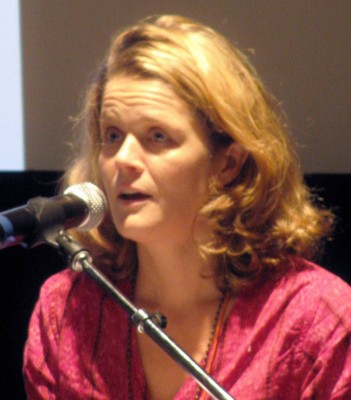
Upon hearing of a young woman’s suicide, Eliza Griswold traveled to Afghanistan with photographer Seamus Murphy to cover the story of Rahila Muska and her poems known as landays, “two-line 22-syllable poems … written by Afghan women about anything from love to drones to even sex.”
“I worked in Afghanistan for a long time, and I came across these poems,” Griswold said. “I worked in Afghanistan from 2003, and the photographer who I worked with — who has worked there for almost 30 years now — and I wanted to further explore the dark humor of Afghan life present in these landays.”
Griswold, an award-winning American journalist and poet whose stories and poetry have been published in The Atlantic, The New Yorker and The New York Times, collected the poems of women like Muska, along with Murphy’s photographs, in “I Am the Beggar of the World: Landays from Contemporary Afghanistan,” her book released in April 2014. Griswold will be delivering a seminar on the poems on Friday at Boston University’s School of Theology.
Muska lived in Helmand, Griswold said, an area with a strong Taliban rule. Her father pulled her out of school in the 5th grade, and the primary source of continuing her education was landays. These landays, she said, serve as a true perspective into the life of over 22 million women who occupy the border between Afghanistan and Pakistan and are forced into silence and obedience. The importance of that outlet is evident in how losing it affected Muska.
“We went once to collect these stories about this young woman whose family wouldn’t let her write poems and had committed suicide, and then we went back again to collect the poems that are in the book,” Griswold said. “But we went for a particular reason during this time: because these are the voices of the women that were going to be most at risk when the U.S. troops left Afghanistan.”
Because Griswold is both a reporter and a poet, she said, there was room to practice both crafts.
“Because they are translations of poems in the book, there was some room for me to work with poetry,” she said. “And then as a reporter, as well, to include the stories of these women that they had shared with us in secret, along with their poems.”
Griswold will also be reading her own poetry on Thursday in the College of General Studies.
“Last spring, I found Eliza’s book of translation of the Afghani folk poems called landays, and I thought, ‘This is the most important book that has been published this year,’” said Meg Tyler, associate professor of humanities in CGS and coordinator of the Thursday reading. “These are poems composed by Afghani women, and these are women we rarely hear from, especially in the west.”
Griswold has gathered a great deal of that perspective through her travels and writing, she said.
“It’s a tremendous privilege to listen to these women’s voices knowing all that they risk sharing this with us.” she said.
As a reporter, she gives this advice to would-be storytellers: “Going there and getting the story is nine-tenths of what you need to do.”
“I’ve spent my life studying poetry and became terribly excited with this absolutely wonderful discovery poetically,” Tyler said. “And I was utterly surprised by the quality of these little poems. They’re so hilarious, some of them are quite dirty-minded, and it’s fabulous. This book allows this new perspective to announce itself in ways it hasn’t announced itself before.”
Eliza Griswold will be coming to Boston University as a guest speaker on Friday from 1 p.m. to 3 p.m. at the School of Theology, Room 625, and will also have a free poetry reading for students at the Poetry Reading Series on Thursday on the 3rd floor of CGS in the Katzenberg Center at 6 p.m.
